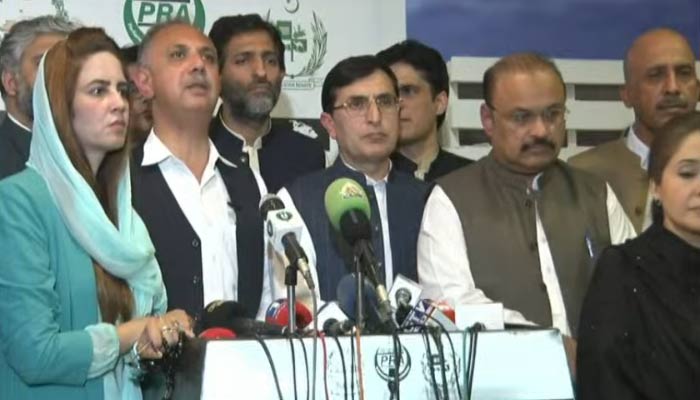

- Opposition says such remarks endanger ties with Afghanistan.
- Ayub says major powers in world faced defeat in Afghanistan.
- "Launching attacks on Afghan soil equal to pushing region in war."
The Pakistan Tehreek-e-Insaf (PTI) fired a fresh salvo at the government on Friday, criticising Defence Minister Khawaja Asif after reports suggested he hinted at launching anti-terror cross-border attacks inside Afghanistan, the war-torn country that shares a 2,640km border with Pakistan.
"We don't allow any interference in our country, so we shouldn't interfere in any other country," members of the united opposition in the National Assembly stated in an emergency meeting on Friday. The meeting of senior opposition leaders took place in the Opposition Lobby in the National Assembly, with former NA Speaker Asad Qaiser and others in attendance.
In a recent interview with a US media outlet, the defence minister ruled out negotiations with the banned Tehreek-e-Taliban Pakistan (TTP).
The government aims not only to curb economic losses caused by the smuggling of oil, fertilisers, and other goods from Afghanistan into Pakistan but also to thwart terrorist infiltration, prevent potential breaches, and implement security checks at the borders.
While condemning Asif's rhetoric, opposition leaders stated that such statements endanger not only the "brotherly" relations between Pakistan and Afghanistan but also regional peace.
"Our ties with India are based on rivalry, and now we are trying to treat Afghanistan similarly. We cannot afford further escalation of the conflict and disorder," Qaiser remarked. He stressed that launching attacks inside a neighbouring country would risk pushing the entire region into war.
Omar Ayub, Leader of the Opposition in the National Assembly, highlighted that "even major world powers have faced challenges in Afghanistan, which has always been considered a geostrategic focal point in the region".
"India is leading many terrorist attacks inside Pakistan. Why didn't the defence minister remark about launching attacks inside India?" he questioned during a media talk outside parliament.
The PTI leader reiterated that his party did not want to drag the country into "someone else's war". Referring to the federal minister's comment about eliminating militancy to attract foreign investment, Ayub asserted that in fact, adherence to the Constitution was necessary for investment.
Meanwhile, PTI Chairman Barrister Gohar stated that Asif's statement had "harmed" the country. "Khawaja Asif made these remarks without taking the assembly into confidence," he added, highlighting the opposition’s crucial role in democracy. Gohar deplored the defence minister’s remarks, suggesting they presented a "negative" image of Pakistan to the world.
In addition, PTI leader Zartaj Gul questioned, “Has the government declared India its friend and Afghanistan its rival?” She picked the defence minister apart even more for what she described as an "extremely irresponsible conversation."
Opposition parties, including PTI and Jamiat Ulama-e-Islam-Fazl (JUI-F), have opposed the anti-militancy operation, demanding that parliament must be brought into the loop about the new operation.
Last Saturday, the Central Apex Committee on the National Action Plan (NAP) approved “Operation Azm-e-Istehkam”, a reinvigorated and re-energised national counter-terrorism drive, to wipe out the menace of terrorism from the country.
In the interview, the defence minister underscored that the decision to launch a new operation was not made hastily, noting a significant surge in terrorist attacks across Pakistan prompted the government in that direction. He stressed that terrorism was linked to the country’s economy, asserting that improvement in economic conditions hinges on the eradication of terror threats.
“How can foreign investment come here without eliminating terrorism?” he questioned. Responding to inquiries, Asif mentioned militant elements operating from across the border, with some cells working within Pakistani territory. “Exporting terrorism from Afghan soil to our territory is a clear violation of international law.”
Asif on Thursday also announced that the government had decided to strictly enforce international laws at its borders with Afghanistan to curb the influx of militants and smuggled goods into the country. Pakistan has witnessed a jump in cross-border attacks on security forces recently, with militants employing advanced weaponry and equipment.
“All traffic from Afghanistan will only be permitted entry into Pakistan with a valid passport and visa,” Asif informed Geo News, hinting at the end of the longstanding practice of Afghans entering Pakistan without proper documentation.












